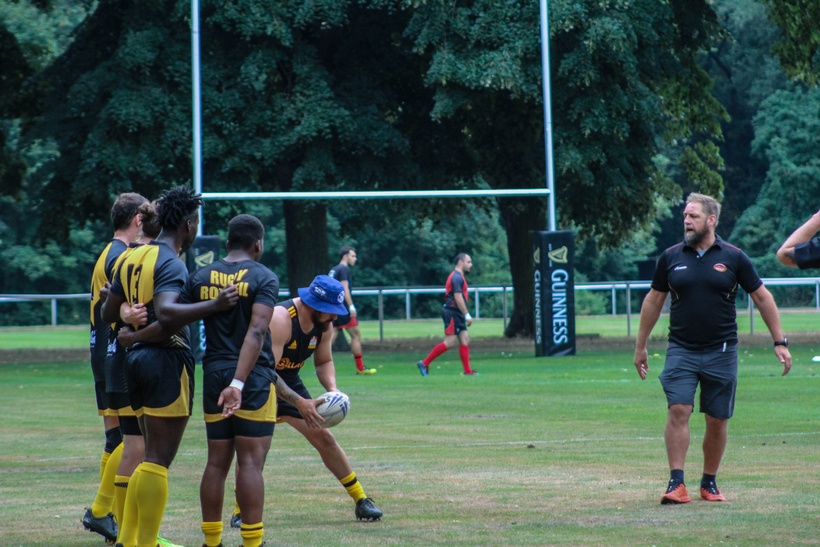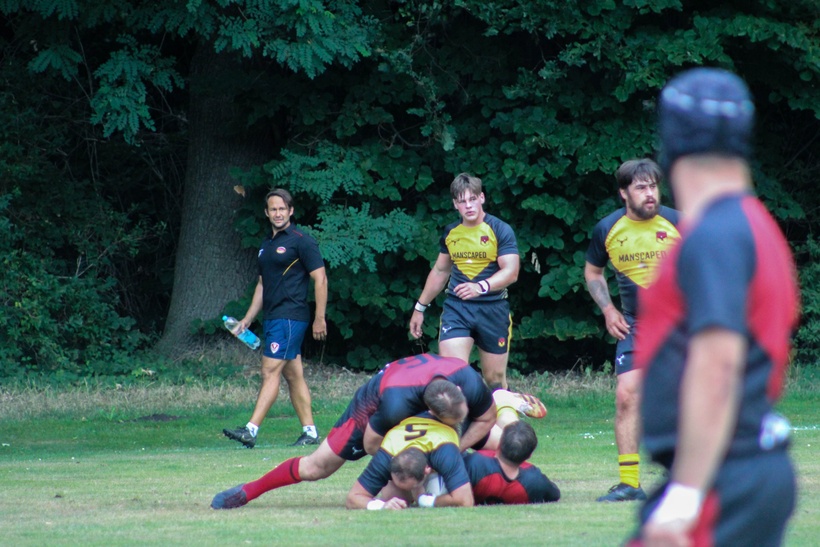BY JOHN DAVIDSON
THINK OF Germany and you might think of beer, bread, Berlin and its international football (soccer) team. Rugby league would never rate a mention. But a pair of Englishmen want to change that fact.
The duo in question are Andy Hay, the former Great Britain international and ex-Leeds, Castleford and Sheffield forward, and player agent Jack Sutton of JS9 Sports. They have teamed up to try and get Germany to qualify for the 2025 World Cup, and hence help grow the sport across the European country.
For Hay, the opportunity came about in early 2021 when he relocated to live in Germany when his wife got a job there. The 49-year-old had spent five years as head of coaching and development of Auckland Rugby League in New Zealand before coming back to the northern hemisphere.
A former head coach of Featherstone and assistant coach at the likes of Salford, Hull FC and Castleford, Hay has now taken up the post of performance director of Nationaler Rugby League Deutschland (NRLD).
“When I moved I contacted the guys here, not knowing what has happened here or if there was a game in Germany,” he explains to rugbyleaguehub.com Long Reads.
“And I’ve been involved since early 2021 helping the guys here. I’m just trying to do my part to help the game grow in Germany and raise the standards of the players. And also connect with some of the professional players as our ambition is to qualify for the 2025 World Cup.
“In Germany there’s a lot of rugby union clubs and rugby league has been here since 2005. Between 2005 and now there’s been two different variations, with people falling out. The NRLD has been going since 2015, the founder passed away around 2018 or 2019.
“The guy who runs it now is from Salford, he’s been here for 30 years. There’s a lot of people here who love the game. We’re gradually finding players and more players who want to play.
“My role as performance director is to try and improve the players we’ve already got, recruit and find and get new players on board. Jack is trying to bring funding and create awareness.”
Hay and Sutton are aware of the challenges they face building up a national team while growing the sport in a vast place where rugby league is virtually unheard of.
“For us, with a country of 88 million people, probably 80 to 200 of those know what rugby league is at all, or have played in it or watched it,” Hay admits.
“That’s the scope of the challenge. The Rugby League World Cup is to create awareness. It’s a soundbite for us that we can use, something the guys have seen, they understand it, they’ve seen other nations play in it.
“They’ve never been close to it. A lot of these guys play rugby union and football is the biggest sport in Germany. If you mention the World Cup, they know what the World Cup is. For us, it’s about creating awareness.

“Heritage players will be involved, and we’re allowed a certain number depending on what part of the qualification process we’re in. The World Cup is the moonshot really.
“Greece, Jamaica, has it done anything for them being in the World Cup? It probably has as its raised awareness, and you go back and more players want to play. That’s the ultimate goal for us.
“We’re not at the stage where we can have a women’s team or a wheelchair team. We’ve got two of us, and everyone who plays the game here are volunteers and staff and board members. Some of us are doing two or three jobs on top of playing. And it just gives us an opportunity to raise more awareness of the World Cup.”
Germany will face Czech Republic and the Netherlands in European World Cup qualifiers in October this year, as they bid to reach the 2025 tournament.
If they defeat the Czechs and Dutch they will then play off against the lower-ranked teams from this year’s European Championships, likely to come from Serbia, Spain, Scotland or Ireland.
Currently ranked 21st in the world, Hay insists it is not a case of qualify for this World Cup or bust.
“If we fall out of the qualifiers this year – there’s three teams in our group and we have to win two games basically to progress – we won’t stop developing the game,” he says.
“It just means we’ll take a different angle. We’ll be aiming for the next World Cup [in 2029] and we’ll take the understandings from this campaign and learn what we need to do better.
“The guys are committed, which they are, we will have five or seven years to wait and go again. They all want success. Some of them played 10, 20 games for Germany and they want a chance of something bigger.”
Jamaica and Greece reached their first men’s World Cups last year and have been growing domestically for the past two decades. Hay describes Germany’s planned progression as similar.
“Serbia are in a different boat, they get government funding from their Olympic committee, so they get a lot of money thrown at them,” he says.
“They link up with Red Star Belgrade. In Germany, unless you’ve got 10,000 members in eight different states you cannot join the Olympic committee, so you cannot get funding. For us, it’s all knocking on doors, raffles, trying to twist people’s arms about a game they’ve never ever seen.
“It’s really starting at rock bottom, people putting hurdles in the way constantly, which sometimes make it difficult. But the guys are really keen to play, I’m keen to help them and coach them. The improvements I’ve seen since I’ve been here have been massive.
“The guys who played rugby union at a good level, there’s not a lot of rugby league so there are subtle differences and those differences get bigger when you go to the next level and then the next level.
“We introduced an Origin game, between north and south Germany, and that’s been great. There’s the Cooper Cup which is a 9s competition. The Bundesliga – that’s our regular club competition, which we have four clubs in. We’re trying to increase that.

“The first year we played the Netherlands and we got beat by 50. This year we beat them 29-24 to take the Griffin Cup back. Germany hadn’t won that for six years. So we’re making good strides. This year we’re going to put a Magic Weekend on.
“Hopefully we can go from four clubs to five this year and six next year. We’re getting good numbers to the training camps now. Again, it’s difficult because of the geography of the country and the vast spread of the players.
“We try to accommodate everyone and grow the game and keep the players we’ve got. There’s some decent, quality players who are learning very quickly and hopefully we can progress going forward.”
From little things big things can grow.
Heritage players will play a role if Germany is to qualify for the World Cup. The Germans have a number of English and Australian-born players eligible to represent them like Batley’s Ben White, North Wales Crusaders’ Brad Billsborough and Hunslet’s Adam Ryder.
“We’ve got an Aussie Jack Ryan who’s at London Skolars,” Hay says.
“The Drinkwater boys [brothers Josh at Warrington and Scott at the Cowboys] have pledged to play for Germany, they’ve put their hands up. And there’s a number of names down in Australia who are eligible, and we’re just going through that process with them because we can only play seven in the qualifiers.”
Hay has been involved in rugby league all his life. Born and raised in Castleford, he played over 350 first-team games between 1990 and 2005.
The lock forward represented his county, his country and Great Britain, playing in both a Super League grand final and a World Cup in 2000, before his move into coaching.
But now the chance to help others in a foreign country, and expand the sport that has given him so much, has him enthused. Germany competing in a World Cup in the years ahead? Don’t rule it out.
“We had 28 players at our national training camp and they came from the north, from Kiel, they came from Munich and Fryberg,” he says.
“One guy came seven hours from Switzerland. It’s just amazing the drive and the desire for these guys wanting to play.
“My passion has been rugby league most of my life. I’ve done very well out of it so I guess I’m putting something back in the game, I’m now doing that in Germany.”


